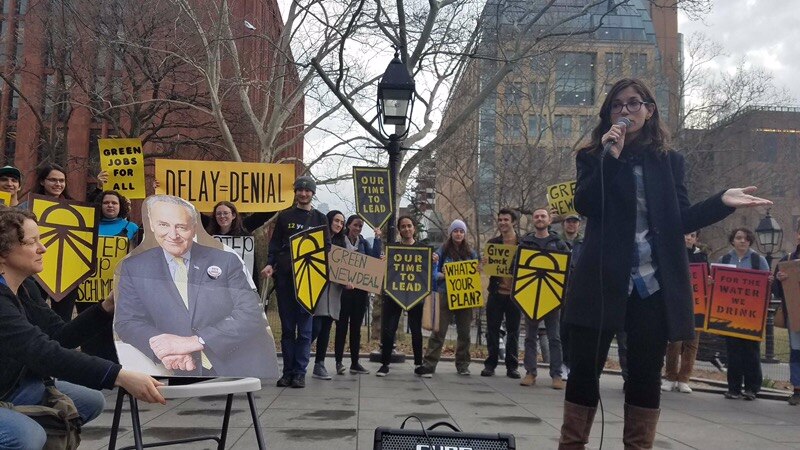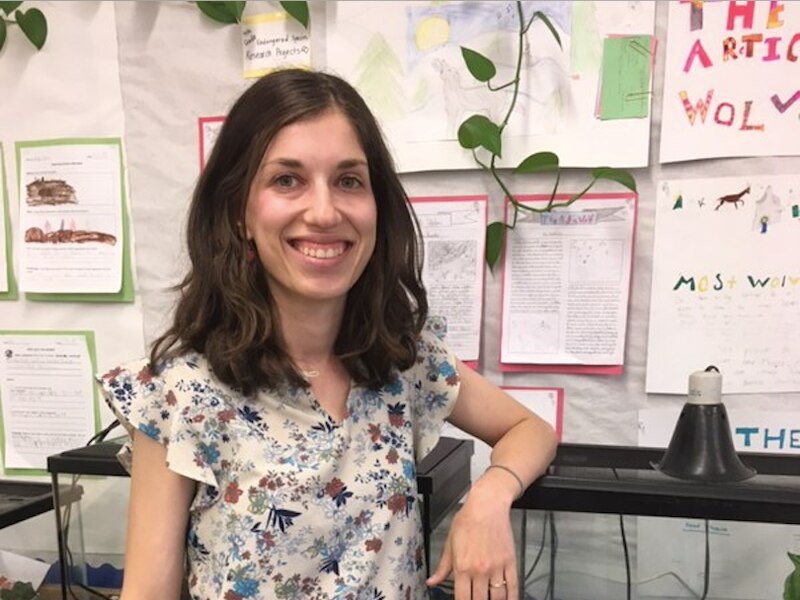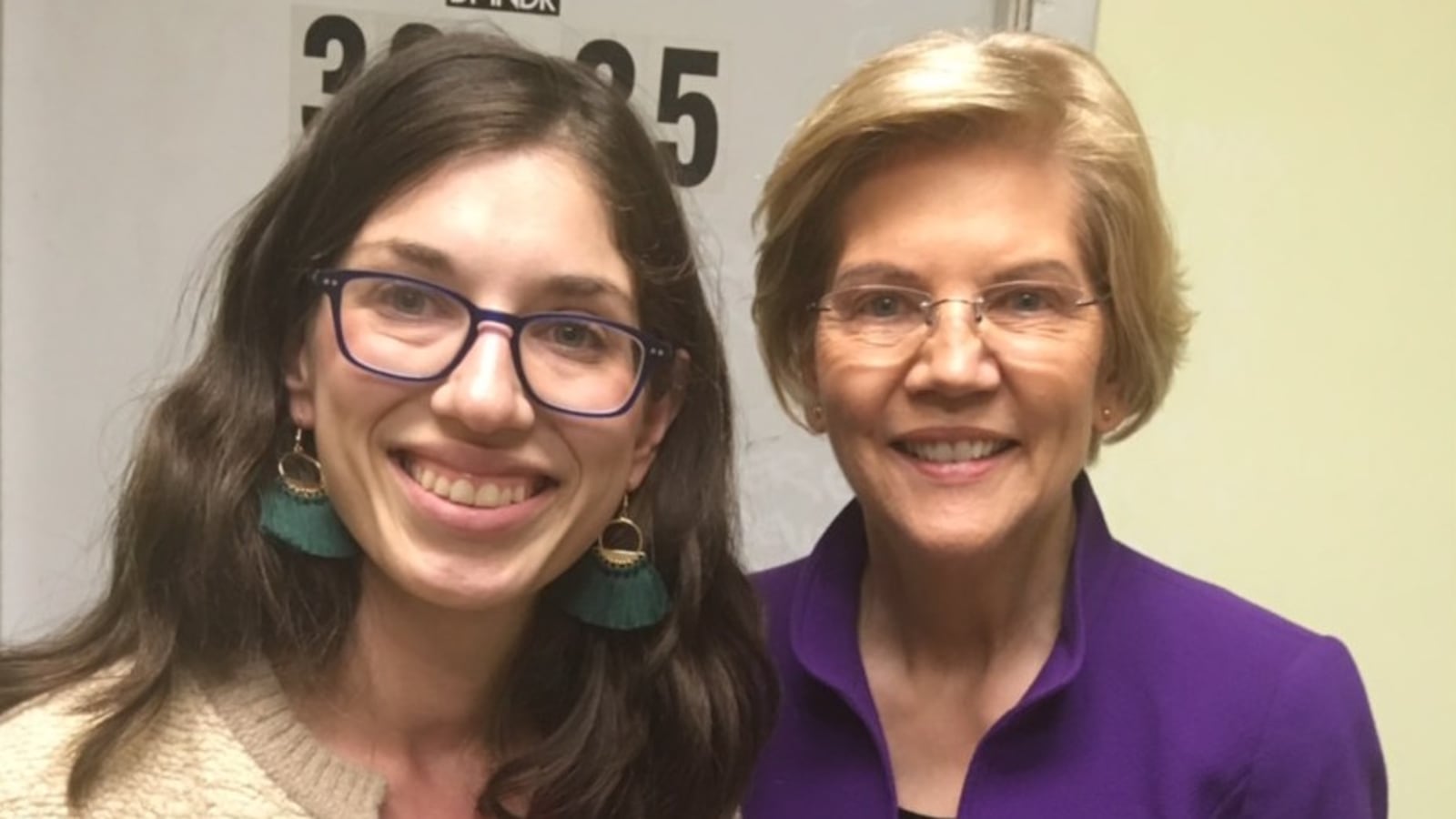Liat Olenick was on her way home from teaching elementary school science on Monday when she saw that a friend had forwarded the latest email from Elizabeth Warren’s presidential campaign.
The email contained Warren’s pledge to choose a public school educator as U.S. education secretary. Wrote Olenick’s friend: “You would be so into this!”
A seventh-year teacher, Olenick was indeed excited about the news. She also knew she was the reason behind it.
Back in March, she had ended a long week of teaching by attending a Warren rally. Afterward, she approached a staffer who turned out to be Warren’s communications director and issued a challenge: Would the candidate commit to elevating a public school educator to the nation’s highest education office?
As a leader of Indivisible Nation BK, a Brooklyn chapter of the grassroots progressive activism movement founded in 2016, Olenick would also make the same request of Bernie Sanders and Kirsten Gillibrand. But Warren’s campaign responded, staying in touch with her until this week.
“Indivisible is all about pushing elected officials at forums, so this was a very Indivisible thing to do,” Olenick said. “But it’s really just a question and I was lucky enough to ask it. It’s something I thought lots of other teachers would be interested in.”
She was right. This week, Olenick has fielded interview requests, won kudos from fellow activists, and gained Twitter followers when Warren credited her publicly. But things have been pretty much normal back at Brooklyn Arbor Elementary School, where Olenick, the staff’s representative to the city teachers union, said she does not “talk about political campaign-related things in a school setting.”
We talked to Olenick about the pledge, how her teaching and activism dovetail, her favorite lesson, and more. This interview has been lightly edited for clarity and length. (We also paused once when Olenick said her turtle tank was at risk of igniting; she added water and returned.)
Was there a moment when you decided to become a teacher?
I was one of those kids who would put stuffed animals on my bed and teach them. I would make my sister be my student. Out of college, I worked with kids because I thought, what else would I do? I became an environmental educator and then went to graduate school at Bank Street College.
How did you become politically active and how is your activism connected to your teaching?
My first year teaching, I worked at a charter school that was in complete chaos and I helped unionize the staff. That was a formative experience for me. I left and ended up at the school that I’m at now. At that time there was a lot of testing and teacher evaluation debate going on and I did a little bit of organizing around that within my school. But the big thing was, like so many other people, when Trump got elected. I needed an outlet. I found activism and quickly found lots of resources and people and learned so many things I never thought about before.
My experiences at school inform my reasons for activism and what my priorities are. I’m passionate about education, I’m passionate about climate change — I’m a science teacher, and I teach my students about climate change. I’ve seen the impact of housing insecurity and immigration policy on students. It’s like a motivator for my after-school activist work.

What public school educators would you want to see on the shortlist? What about you?
There are so many qualified, knowledgeable teachers and principals out there. I don’t think I know who the right person is, but I know someone is out there who has the real-world experience and policy background and the ability to manage people and think strategically and create messages — and who understands what teachers and kids are facing every day.
What’s important is it’s someone who spent significant time teaching kids in public schools and someone who understands the implications of policy.
There’s so much that needs to be done, reversing the deregulating that Betsy DeVos has done and funding early childhood education and giving protections for teachers and teachers unions. Instead of incentivizing high-stakes testing, we should be incentivizing integration, small class sizes, science education — all these things that actually help kids.
As for my own career, I would be excited about being in a position where I can really make policy change happen one way or another, but I’m not sure how I want to do that. And right now I love teaching elementary school science!
What’s the most rewarding thing about being a teacher?
Connecting with kids. This doesn’t happen often during the day, but the moments where there’s downtime, and the kids are having fun and they’re self-directed and mellow, and you can see their delightful selves — that’s the best.
I was showing an animal to a pre-K class recently, and they absolutely love looking at animals more than anything. It was a bearded dragon and they were all trying to kiss it. A bearded dragon is not at all kissable. It’s a lizard.
With all that’s going on politically, I’m glad I get to spend my day with little people who are excited and sweet and I get to tune out all the news for part of the day.
What part of your job is most difficult?
The hardest part is never feeling like you are doing enough. There’s always more you can do. You always have too many students with so many different needs. A lot of them you can’t meet by yourself but you want to. Your to-do list is unending. It can be emotionally draining to have that feeling all the time.
If I had six more hours in the day, oh my god. I would sleep an hour more every day. I would probably do some more activism. And I would try to have an hour outside and with my husband, too.
What’s something happening in the community that affects what goes on inside your class?
My school is in Williamsburg, so it has undergone a lot of gentrification. There’s a lot of new development and housing insecurity, where people are needing to move in the middle of the school year. It’s a big issue in my school and something I’ve written about as an activist.
We’ve had a number of students unenroll in the middle of the year, or are in temporary housing, and that has a big impact. Some families in temporary housing, their kids are late because they’re commuting from far away, and obviously they miss instruction, or if they get to school on time they had to wake at 4 a.m. to get here. The students who move in the middle of the year, it affects them but it also affects the friends they left behind — it’s a lot of change in their classes. I’ve done a lot of research, too — I know it hurts them academically.
What are you reading right now?
“The Body Keeps the Score: Brain, Mind, and Body in the Healing of Trauma.” As a teacher and as a person who has experienced pretty severe illness, it feels incredibly relevant. There’s a lot about cognitive development and how trauma impacts cognitive development and how even people with a lot of knowledge about children — like teachers — can respond to trauma in a way that can make things worse rather than better.
I’ve worked with kids whose behavior suggested they had experienced a trauma, kids who would run away when they get upset, would go from 0 to 10 quickly, would get upset really easily even when something isn’t going to hurt them. I’m thinking about how our education system is supporting kids who have experienced that, and how schools — not mine — are cutting art, dance, and music even though research has shown that those things help kids who have experienced trauma feel connected to other students.
Tell us about a favorite lesson to teach. Where did the idea come from?

I used to do this project on water pollution in New York City waterways. We would do a lesson where kids had to design a filter that would mimic an oyster. They would make dirty water and try to filter it out, comparing it to how fast an oyster would filter the water. We went canoeing as part of the project, in Brooklyn on Newtown Creek.
Now there’s a new science curriculum and there’s no water unit in fourth grade anymore. It’s always hard when you’re used to something or attached to something to give it up, but I like being creative and coming up with new ideas, so it’s been a nice way to try new things. With a new curriculum there’s a process of learning what’s really usable, because you’re never in the ideal setting. You have to think, what can I actually do? What makes sense for these kids? What makes sense for where we are in our school community? What will be exciting and what will not be?
What object would you be helpless without during the school day?
Coffee. I have one cup first thing in the morning, and another during the day. I try not to have a third but sometimes I do. If I didn’t have coffee I couldn’t go to school.
What was the biggest misconception that you initially brought to teaching?
I was lucky in that I kind of eased into classroom teaching and wasn’t thrown in on day one. Still, I had this idea that I could control everything, every part of my kids’ day-to-day experiences, and that I should control everything, that it was my job to do so. It took some time to realize that sometimes being a good teacher means letting go of control, both to foster independence in my students but also — there are some things you can’t control, and you need to work with the resources and the kids you have.
What’s the best advice you’ve ever gotten about teaching? What advice would you want?
I got advice in my first year to invest in personal relationships with my colleagues, to take a step back from the work you’re trying to do and have lunch with them, get to know them, ask them about your day. In building that relationship you’ll be able to fix what’s not working. It was really helpful.
At this point, I want fair funding for public schools, small classes, and housing justice, instead of advice. I’m still growing and learning as a teacher, but ultimately those are the big issues.
What advice do you have for other educators?
One thing I’ve learned is that it’s helpful to keep in mind my goal. I went from being a classroom teacher to a specialist where I see kids once a week. It’s a short amount of time, and I don’t know them as well as I would if I were their classroom teacher, so I try to make the environment really exciting. It’s a little science museum they get to come to once a week. Just remembering that goal — that I want them to feel excited about science and connected to the place — helps me.
Also, I think teachers should not be hesitant to get involved in activism — on their own time, after work! — because there’s a lot at stake.


